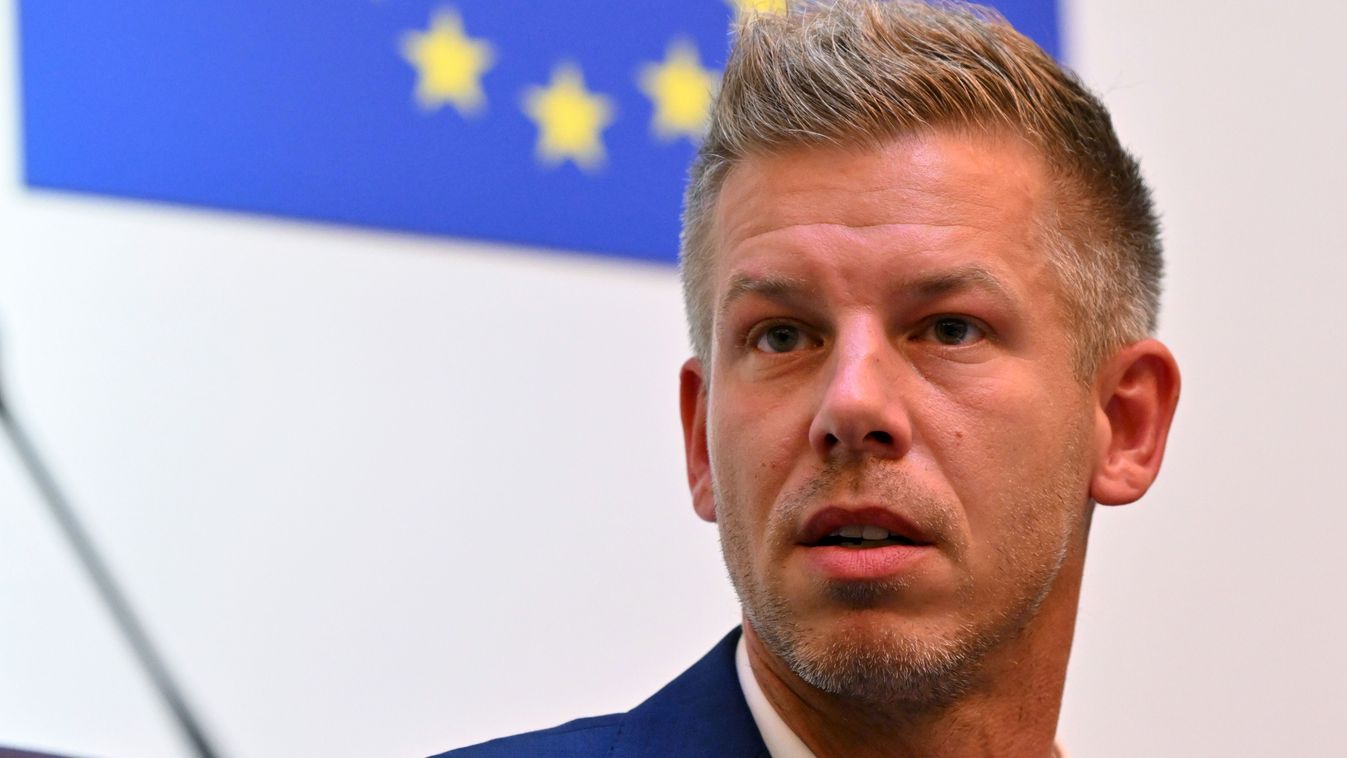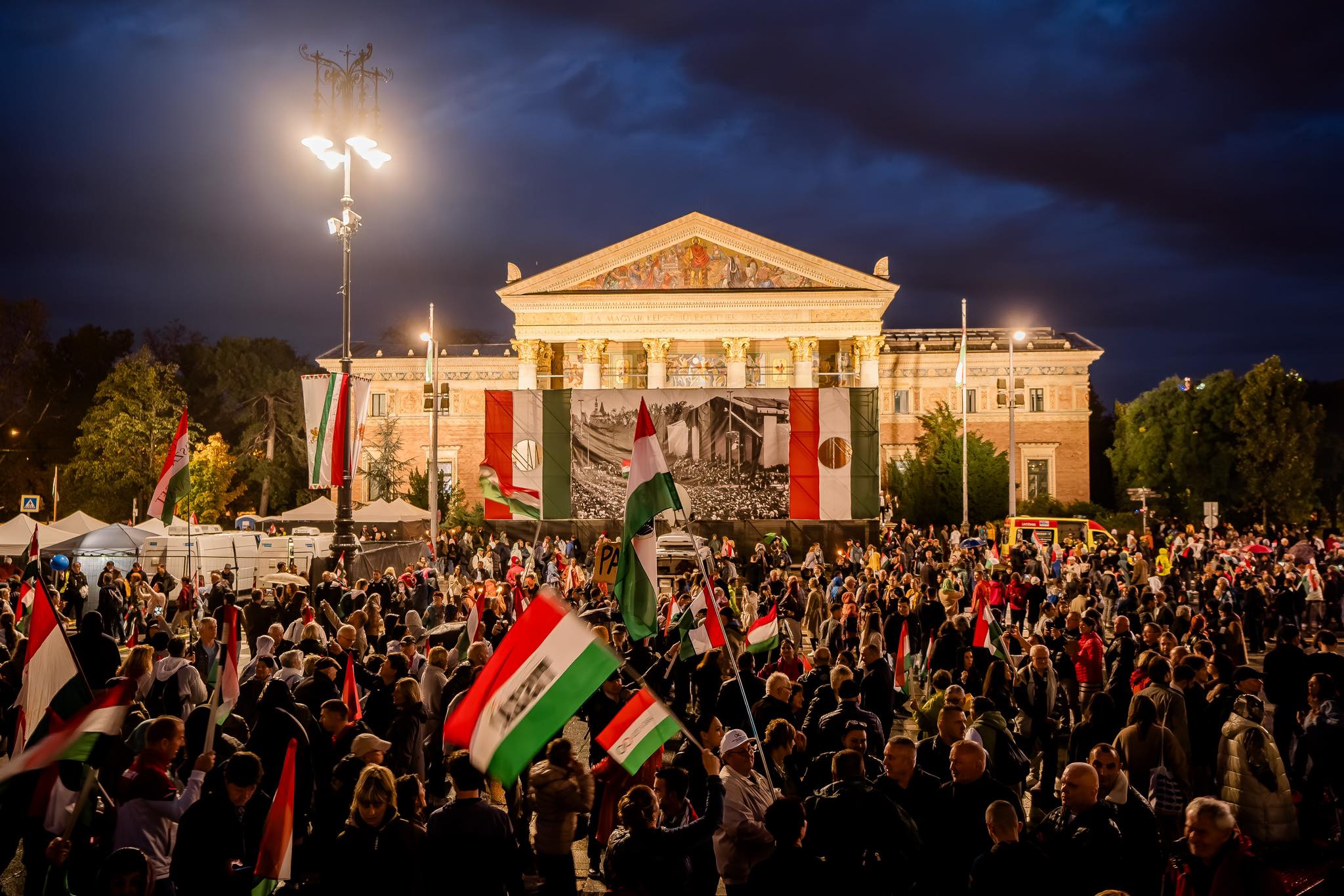Western policymakers hoping Hungary's April 2026 election solves the Ukraine obstruction problem need to look closer at the man they're counting on. Péter Magyar, the opposition leader polling ahead of Viktor Orbán, opposes Ukraine's fast-track EU membership, won't support weapons deliveries, and has explicitly admitted he avoids the Ukraine topic because it's "too divisive" for voters he needs to persuade.
On Thursday, hundreds of thousands filled Budapest's streets in rival demonstrations—the latest barometer of the political contest ahead of April's election. Magyar's supporters shouted "Russians go home!" at Heroes' Square, while Orbán's pro-government marchers carried banners reading "We don't want to die for Ukraine!"
Regime change won't change Hungary's stance. The problem runs deeper than one leader, Hungarian journalist Szilárd Teczár tells Euromaidan Press.
Magyar's actual position: softer words, same obstruction

Magyar calls Russia the aggressor—a rhetorical improvement over Orbán's careful silence. But when pressed on substance, he said Ukraine "is at war and currently does not meet the accession criteria, so no one can seriously consider this a relevant issue."
What practically means: no fast-track EU membership, no urgent action. Just vague future promises.
His Tisza Party MEPs voted for a September 2024 European Parliament resolution calling for more weapons to Ukraine. They wore Ukrainian flag T-shirts for Zelenskyy's 1,000-day war speech.
But when it mattered—when the European People's Party drafted a hawkish defense declaration in March 2025—Magyar's signature mysteriously appeared and then mysteriously disappeared.
The document called for unconditional military support, lifting restrictions on Western weapons striking Russian territory, and requiring member states to allocate 0.25% of GDP to Ukraine. Magyar claimed for days his signature was added "by mistake"—until European Parliament President Roberto Metsola confirmed the error would be "remedied."
Even if genuine, the incident reveals Magyar's dilemma: the EPP expects full Ukraine support as the price of membership, but Hungarian voters punish politicians who provide it.

Why he can't change course
"Magyar openly admitted in an interview that he shouldn't emphasize this topic too much because it's very divisive in society, and he needs to concentrate on things where he can persuade the most voters," explains Szilárd Teczár, a Hungarian researcher specializing in disinformation and foreign information manipulation, in an interview with Euromaidan Press.

The numbers back his caution. When Magyar's own Tisza Party conducted an informal referendum on Ukraine's EU membership, only 58% of his supporters favored it—hardly a mandate for championing Kyiv's cause. Meanwhile, Orbán's government-backed consultation claimed 95% opposition, though Magyar dismissed it as propaganda with just 3-7% actual participation.
"Society is very polarized," Teczár says. On one side, people who see Putin as a war criminal. On the other, Orbán supporters who've absorbed years of anti-Ukraine messaging. Magyar's right-wing voter base won't tolerate a pro-Ukraine shift, and Fidesz stands ready to brand any Ukraine support as betrayal.
They've already started. The government ran billboards portraying Zelenskyy alongside Magyar, painting both as threats to Hungary. When one of Magyar's military advisors, former Chief of General Staff Romulusz Ruszin-Szendi, suggested that EU membership could enable troop deployment to Ukraine, Fidesz weaponized it instantly: "Magyar wants to send Hungarian soldiers to die in Ukraine."
"All the smear campaign tactics don't really work against them the way they did before," Teczár notes, since Magyar came "from inside Fidesz—he's a right-winger as well." But this means Magyar must be even more careful not to provide ammunition. Pro-Ukraine positions are ammunition.
The electoral math that prevents change
Magyar's Tisza Party has surged since emerging in early 2024, achieving nearly 30% in the European Parliament elections and polling competitively with Fidesz heading into April 2026. Opposition-aligned polls show Tisza leading 43-44% to Fidesz's 35-41%, though pro-government pollsters dispute these numbers.
But those voters Magyar needs to win? They're not pro-Ukraine. Fidesz's base—older, rural, less educated Hungarians who've dominated elections since 2010—opposes Ukraine support even more strongly than the national average. Meanwhile, younger urban voters who might support Ukraine are already with Magyar. He has little to gain and much to lose by championing Kyiv's cause.
"I would still be very cautious about predicting election results," Teczár warns. "Fidesz has advantages in terms of financial resources, representation in the state apparatus, and so on."
Even if Magyar wins, his hands remain tied. He's promised to prioritize "Hungary's national interests" over personal political motives when using EU vetoes—a distinction without much difference when Hungarian public opinion opposes Ukraine membership and weapons deliveries.

The Publicus Institute poll conducted 11-18 October 2024 showed Tisza at 24% among the entire population versus Fidesz at 23%, but among decided voters, the breakdown was 39% for Tisza versus 37% for Fidesz.
According to Medián poll from November 2024, among those with party preference, Tisza's lead was 43% against 39% for Fidesz, and among voters promising to participate, Tisza garnered 46% while Fidesz gained only 39%.
Trending Now
Vox Populi, which compiles polling institute data, showed Tisza in the lead in September 2025 by anywhere from 4% to 14%.
What would actually change
The optimistic scenario: Magyar might be quieter about opposition. He won't actively tour Europe undermining Ukraine the way Orbán does. He might not veto every single Ukraine-related measure, just most of them.
Teczár sees a marginal shift possible: "Maybe after the elections, if they win, there could be changes." But the timeline matters—any softening would come after April 2026, meaning another year of Hungarian obstruction at minimum.
The rhetoric would improve. Magyar acknowledges Russia as the aggressor. He criticizes Orbán for using veto power for "personal political motives" rather than national interests. But when Magyar says he'll use the veto for Hungary's interests instead, what does that mean? The same obstruction, just with better PR.
The structural problem Western allies miss
This isn't about Viktor Orbán's personal relationship with Putin. It's not about one leader's corruption or authoritarian tendencies. Those factors matter, but they're not the whole story.
Hungary's media ecosystem has been captured. Orbán's government controls most major outlets, and they've spent years framing Ukraine support as dangerous for Hungary.
The narratives have penetrated: Ukraine membership threatens Hungarian jobs, Ukrainian language laws oppress Hungarian minorities in Transcarpathia, supporting Ukraine means war escalation that Hungary can't afford.
"Because of the very close alignment between Fidesz narratives and Kremlin narratives, my feeling is that Russia simply doesn't need to invest too many resources in Hungary," Teczár explains. "Very powerful players are already doing their job anyway."
Even if Magyar wanted to help Ukraine—and there's little evidence he does—he couldn't survive it politically. Fidesz would paint him as Brussels' puppet, as a warmonger sending Hungarian boys to die for foreign interests, as an enemy of ethnic Hungarians in Ukraine. And enough voters would believe it to cost him the election.

The lesson for Western policymakers
Betting on April 2026 to solve the Hungary problem means another year minimum of obstruction, followed by—at best—marginally softer obstruction from a leader who still opposes Ukraine's fast-track EU membership and weapons deliveries.
Western allies need Plan B. That might mean finding ways to work around Hungarian vetoes, strengthening bilateral support for Ukraine that doesn't require unanimity, or making Hungary's obstruction so costly that even Magyar's "national interest" calculation shifts.
But the magical thinking that regime change automatically means policy change? That needs to end. Magyar's own words and actions show he's offering Orbán-lite on Ukraine, not a reversal.
The sooner Western capitals accept this, the sooner they can develop strategies that don't depend on Hungarian cooperation that isn't coming—regardless of who wins in April.

